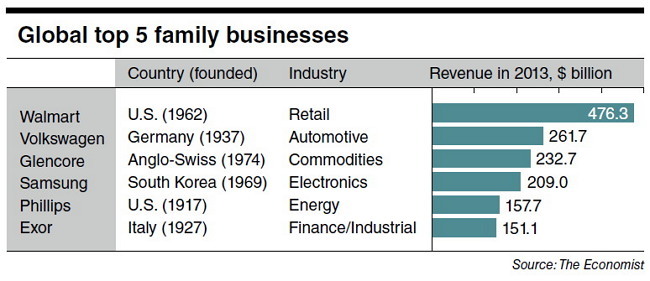[SUPER RICH] Influence of family businesses rising globally: McKinsey
By Seo Jee-yeonPublished : Nov. 10, 2014 - 19:27
Despite growing criticism of Korea’s family-controlled conglomerates, known locally as chaebol, U.S. management consultancy McKinsey found that family businesses are stronger and more vital around the world than ever before.
According to McKinsey’s report on founder- and family-owned businesses, about one-third of the Fortune Global 500 companies are founder- or family-controlled, as are 40 percent of the major listed companies in Europe.
“Family businesses are especially important in emerging markets, accounting for about 60 percent of private-sector companies with revenues of $1 billion or more,” the report said.

Around 85 percent of over 1 billion businesses in Southeast Asia are family-run, along with around 75 percent in Latin America and 67 percent in the Middle East. Even in China, which is based on a socialist market economy, about 40 percent of private firms are family businesses, the report noted.
“Given the growth of emerging regions, the influence of family businesses on the global economy is likely to increase,” the report forecast.
When it comes to family firms’ edge over other firms, the McKinsey report said that whether private or public, family firms tend to take a longer-term perspective and have a sense of mission that can suffuse and uplift the whole organization.
In addition, owner-managers can move much more rapidly than professional managers when there is no need to pass decisions up a chain of command or in front of an uncooperative board.
“A third benefit is that, in emerging markets in particular, founder- and-family-owned businesses often have a demonstrable, even dominant home-field advantage in doing businesses,” the report added.
Family firms have critical challenges of their own as well. One of these is growth. McKinsey’s research showed conglomerates in China, India and South Korea are entering new businesses at a startling pace, entering one new business every 18 months on average.
Another challenge is succession. “Many businesses falter at the first transition, from the founder to the second generation, and only 13 percent survive to the third generation,” the consultancy said.
By Seo Jee-yeon (jyseo@heraldcorp.com)
According to McKinsey’s report on founder- and family-owned businesses, about one-third of the Fortune Global 500 companies are founder- or family-controlled, as are 40 percent of the major listed companies in Europe.
“Family businesses are especially important in emerging markets, accounting for about 60 percent of private-sector companies with revenues of $1 billion or more,” the report said.

Around 85 percent of over 1 billion businesses in Southeast Asia are family-run, along with around 75 percent in Latin America and 67 percent in the Middle East. Even in China, which is based on a socialist market economy, about 40 percent of private firms are family businesses, the report noted.
“Given the growth of emerging regions, the influence of family businesses on the global economy is likely to increase,” the report forecast.
When it comes to family firms’ edge over other firms, the McKinsey report said that whether private or public, family firms tend to take a longer-term perspective and have a sense of mission that can suffuse and uplift the whole organization.
In addition, owner-managers can move much more rapidly than professional managers when there is no need to pass decisions up a chain of command or in front of an uncooperative board.
“A third benefit is that, in emerging markets in particular, founder- and-family-owned businesses often have a demonstrable, even dominant home-field advantage in doing businesses,” the report added.
Family firms have critical challenges of their own as well. One of these is growth. McKinsey’s research showed conglomerates in China, India and South Korea are entering new businesses at a startling pace, entering one new business every 18 months on average.
Another challenge is succession. “Many businesses falter at the first transition, from the founder to the second generation, and only 13 percent survive to the third generation,” the consultancy said.
By Seo Jee-yeon (jyseo@heraldcorp.com)




![[Herald Interview] 'Amid aging population, Korea to invite more young professionals from overseas'](http://res.heraldm.com/phpwas/restmb_idxmake.php?idx=644&simg=/content/image/2024/04/24/20240424050844_0.jpg&u=20240424200058)












![[KH Explains] Korean shipbuilding stocks rally: Real growth or bubble?](http://res.heraldm.com/phpwas/restmb_idxmake.php?idx=652&simg=/content/image/2024/04/25/20240425050656_0.jpg&u=)

